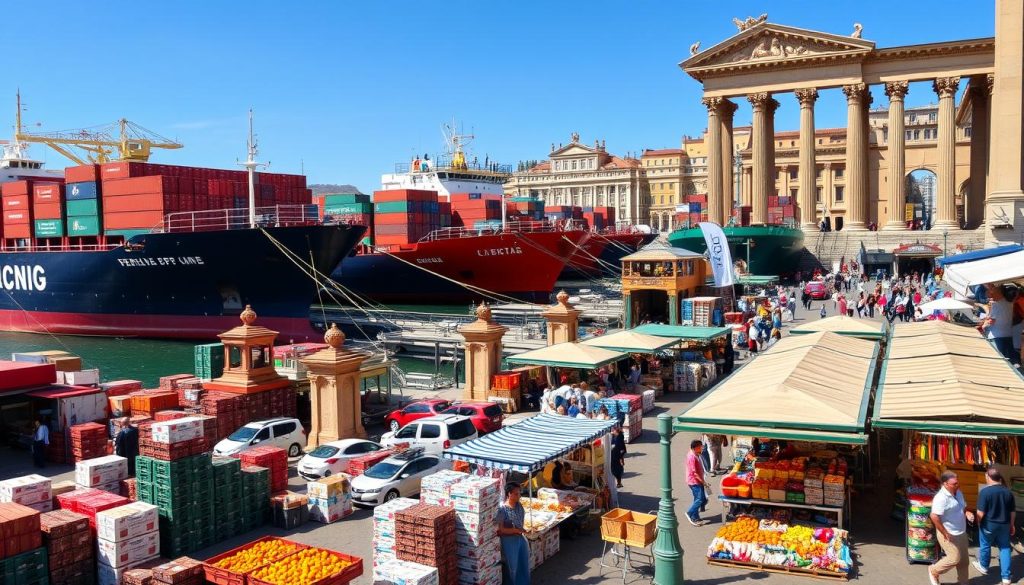Italy is a land of rich culture and diverse economic prospects. It’s a great place for foreign entrepreneurs looking for business opportunities. The country has a strategic location in the European Union, a skilled workforce, and extensive trade networks.
It offers many entrepreneurial ventures, especially in tourism, import/export, and cultural services. For example, the tourism and hospitality industry attracts over 94 million tourists every year. This brings in billions of euros to Italy’s economy. Starting businesses like boutique hotels and tour operators in major cities requires significant investments.
Successful businesses, like La Grande Quercia Gelateria, show the potential for growth in this vibrant market.
Key Takeaways
- Italy offers a wealth of business opportunities in various sectors, particularly tourism and hospitality.
- The tourism industry alone welcomed over 94 million visitors in 2019, showcasing its potential.
- Foreign investments in Italy can benefit from duty-free access to 30 countries within the European Economic Area.
- Establishing a business such as a boutique hotel requires significant investment, often ranging between €500,000 and €2 million.
- Italy’s third-largest economy in the Eurozone highlights the lucrative potential for foreign entrepreneurs.
Introduction to Doing Business in Italy

Starting a business in Italy is both exciting and challenging for foreign entrepreneurs. The country’s business environment is friendly, with a strong focus on industries like machinery and renewable energy. Italy is home to over 18,000 companies in the Machinery & Equipment sector. It’s also a top producer of renewable energy in Europe, showing great potential in Greentech.
It’s important for entrepreneurs to learn about local customs and the language. Cultural differences can greatly affect how well a business does. Knowing these can help a lot in negotiations and day-to-day operations.
The Italian market is eager for new and flexible business ideas, especially after the pandemic. Italy is at the forefront of the Circular Economy, with a high recycling rate of 83.2%. This makes it a great place for sustainable business ventures.
Italy is famous for its fashion, design, and furniture industries. It’s the world’s top exporter of fabrics and fashion accessories. The food and agrifoodtech sectors are also booming, with over 51,000 specialised companies. Knowing these facts is key for success in the Italian market.
The Italian Market Landscape

The Italian market is full of life and opportunities for business and investment. Italy is the eighth biggest economy worldwide. It shines in areas like manufacturing, design, luxury goods, and food services. Over the last ten years, the retail and wholesale trade sectors have grown by about 1.75% each year.
This growth is similar to other big European countries like Germany, France, and Spain. Italy’s rich industrial history and skilled workers make it a great place for foreign investors.
Italy is a big player in exports, being the second largest manufacturer in Europe and fifth globally. Wine, footwear, fashion, and furniture are key areas of growth. The mechanical machinery sector is worth 80 billion euros, followed by chemicals and pharmaceuticals.
In 2021, Italy saw a big jump in foreign direct investment, the largest in Europe. Almost 70% of these investments aim to tap into Italy’s large local market of nearly 60 million people.
The pandemic has changed the market, pushing businesses to change fast. The government has set up funding for big projects in manufacturing and tourism. They offer up to 75% funding for eligible costs.
Italy is also a leader in innovation, with many research institutes and technological hubs. In 2021, there were 332,596 new businesses, a 14% increase from the year before.
Business Opportunities in Italy for Foreigners

Italy is full of chances for foreigners to invest, especially in tourism, food, and cultural exchanges. Its rich history and beautiful landscapes attract many visitors. This leads to a big need for travel and hospitality services tailored to different tastes.
The food industry in Italy is booming. It’s famous worldwide for its high-quality food products. With over 854 unique PDO and PGI products, there’s a lot of potential for businesses that focus on ethnic foods or specialty stores. This ensures they stand out in their niche markets.
Overview of the Opportunities Available
In Italy, there are many chances to invest in different areas. The Machinery & Equipment sector has over 18,000 companies, showing a focus on quality and innovation. Italy is also a big player in renewable energy, making it a great place for clean energy businesses.
Entrepreneurs can also dive into the tourism sector. They can offer customised travel services to the many visitors coming to Italy’s historical and cultural sites.
Challenges Faced by Foreign Entrepreneurs
Even with many opportunities, foreign entrepreneurs face challenges. Dealing with Italian bureaucracy is a big one. The tax system is complex, with different levels of taxes to navigate.
Cultural differences can also affect business dealings. This makes it important for foreign entrepreneurs to understand local customs and get help from those who know the system well. Also, some regions in Italy are better for investment than others.
Starting a Business in Italy: Key Steps

Starting a business in Italy requires several important steps. First, you need to choose the right business structure. You can pick from sole proprietorship, partnership, limited liability company, or joint-stock company. Then, you must register your business with the Italian Commercial Registry.
This involves filling out forms and submitting documents like the Articles of Association and proof of initial capital. Getting a tax identification number, or Codice Fiscale, is also crucial. It helps you meet tax obligations.
Opening a preliminary bank account is necessary. You’ll need to deposit the minimum share capital, which can be between €1 and €10,000. This depends on the business structure you choose.
The costs of starting a business can vary a lot. Initial expenses can be between €5,650 in the first year and €1,850 in later years. This includes the cost of incorporation and registration. Notary fees can average around €520 for company incorporation.
It’s also important to think about the costs of getting necessary licenses and permits. These are key for legal compliance.
Types of Business Structures for Foreigners

Foreign entrepreneurs in Italy have many legal options. The most common are Sole Proprietorships, Limited Liability Companies (SRL), and Joint-Stock Companies (SpA). Each has its own needs and rules.
The Limited Liability Company (SRL) is popular because it only needs €1 in share capital. On the other hand, Public Limited Companies (SpA) need €50,000 to start. The Simplified Limited Liability Company (SRLS) is a good choice for those with less money, needing only €1 and allowing up to €9,999 in contributions.
The SRLS makes starting a business cheaper because it doesn’t have notary fees. It also protects personal assets from business debts. But, it can’t be used for banking or insurance, limiting what you can do.
To start a Cooperative Society, you need at least three members, each contributing €25. Remember, you must follow Italian tax laws, with a corporate tax rate of 24% and extra taxes by region.
Legal Requirements for Foreign Entrepreneurs

Foreign entrepreneurs wanting to start a business in Italy must follow certain legal steps. The first step is to prepare the right documents for business registration. You’ll need identification, company papers, and an Italian tax number (Codice Fiscale). Also, a detailed business plan with your plans and financial forecasts is key.
Necessary Documentation
To meet legal needs, you must collect specific documents for starting a business in Italy. These include:
- Identification documents
- Company registration papers
- Italian tax identification number (Codice Fiscale)
- A business plan with financial projections
By submitting these documents, you follow local laws and make the registration process easier. Knowing these rules is crucial for foreign entrepreneurs to deal with the Italian bureaucracy well.
Obtaining Licences and Permits
Getting the right licences and permits is also crucial. Different businesses need different licences. For example, the SCIA (Segnalazione Certificata di Inizio Attività) is needed for many sectors. You might also need extra approvals for things like food service and tourism. It’s important to research local rules to stay legal and avoid problems.
Cost Considerations for Starting a Business in Italy

The cost of starting a business in Italy varies based on the type of business and its location. The initial investment for setting up a company is about €5,650. This includes fees for incorporation and other early costs like registering with the Trade Register for around €520. Trademark registrations start at €200 for one category, with an extra €34 for each additional category.
Annual operational costs can be around €1,850 to keep the business running. This includes extra costs for accounting services, which start at €130 per month.
Businesses also need to think about monthly fees for virtual office services, which are about €100. It’s important for entrepreneurs to have a clear financial plan. This should include all these costs to manage their startup well. Companies must also know about the 24% Corporate Income Tax (IRES) and the 22% general VAT rate once they start.
Popular Business Ideas for Foreigners

Foreign entrepreneurs looking at Italy for business will find many opportunities. The ethnic restaurant business is especially appealing. It lets owners mix their culinary skills with their cultural background. This way, they can introduce authentic foreign cuisine to a wide audience.
Opening an Ethnic Restaurant
Ristorante Etiopia in Rome is a great example. It serves authentic Ethiopian dishes, attracting both locals and tourists. Success in this field depends on a good location, a varied menu, and top-quality ingredients. It’s a great choice for those who love cooking and want to make a mark in Italy.
Establishing a Language School
Italy’s constant flow of tourists and expats makes starting a language school a smart move. Schools like Scuola di Lingue Easy Languages in Milan offer custom language courses. They meet the educational needs of many, thanks to partnerships with local schools.
Cultural Exchange Centres
Cultural exchange centres are key for building understanding between cultures. They host events, workshops, and team up with local groups. This way, they engage the community and make money from tickets and partnerships. Casa della Cultura in Florence shows how these centres can thrive, boosting cultural exchange in Italy.
Import/Export Opportunities in Italy

Italy is a great place for foreign entrepreneurs to find import/export chances in many fields. Its strong trade position and big economy make it attractive. With a GDP of $2,068.60 billion in 2022, it’s a hub for fashion, food, and manufacturing. Startups can thrive here, thanks to support for new businesses.
To do well in Italy’s import/export scene, you need to research the market, find suppliers, and know the rules. Companies coming in must follow tax and data protection laws. Small businesses get help with setting up and managing taxes.
Italy’s tech industry is growing, drawing in global companies. It offers help with patents and tax planning. The tourism sector also has unique chances, with help for licenses and staff. Casa del Gusto in Turin is a success story, focusing on specialty food imports.
In short, Italy offers full support for international investors. Having a plan for legal compliance can help avoid risks in trade. This ensures smooth operations in this promising market.
The Potential of the Tourism Industry

The tourism industry in Italy is a big help to the economy. It offers many chances for entrepreneurs to start travel services for foreign tourists. Italy welcomes over 60 million tourists every year. This means more money can be made in hospitality and other services.
Customised Travel Services
Customised travel services are very appealing. They let businesses create special itineraries for visitors. In Q1 2024, hotels got €330 million in investments, showing how important they are. With more tourists coming, there’s a great chance to offer unique experiences.
Tour Guide Services
Starting a tour guide service can make a lot of money. Italy’s rich culture and sights attract many visitors. Tour operators can focus on things like food and special themes to draw in different people.
Italy’s tourist numbers are getting back to normal, with a 4.8% recovery in 2023. This shows there’s a big demand for guided tours. Entrepreneurs need to get the right permits and market well to succeed. With new hotels planned, the tourism scene is set to get even more exciting.
Innovative Business Ideas: Leveraging Technology

Technology has changed how businesses work, especially with online marketplaces. These platforms help entrepreneurs reach more customers. In Italy, this trend is growing fast, offering many chances for new ideas and growth.
Online Marketplaces
Italy is getting more money for new businesses, showing it’s good for start-ups. The big market there helps companies grow before they go global. Now, people want easy-to-use sites, strong security, and good customer service.
Artigiani del Mondo is a great example of an online marketplace. It shows off Italy’s culture through handmade crafts. Such sites are great for unique items and special services. A study shows many new businesses face challenges, but there are still lots of chances for new ideas.
Italy’s tech scene is also growing, especially in apps and SaaS. With more money for start-ups, like €1 billion from Italy’s CDP Venture Capital, things look good for new businesses. Creating digital platforms not only helps businesses but also boosts Italy’s economy.
Challenges of Navigating Italian Bureaucracy

Starting a business in Italy can be tough for foreign entrepreneurs. The process of registering a business is full of challenges. Legal issues often slow down the start of operations.
The rules in Italy are not always clear. This makes following them difficult and time-consuming.
By October 2022, Italy had 14,708 new startups. This shows the country’s entrepreneurial spirit, despite the red tape. The government has launched programs like CDP Venture Capital and the Italian Startup Act. These offer tax breaks and support for new businesses.
But, dealing with the bureaucracy takes up a lot of time and resources. This can distract from the main business goals and limit growth.
Italy’s different rules across regions add to the challenges. Entrepreneurs need to find ways to scale their businesses. Getting help from local experts is key. They know the local business scene well and can guide on compliance.
Coaches can also help entrepreneurs understand the local culture. They offer tips on how to overcome obstacles and use resources wisely.
For startups to succeed, embracing digital transformation is vital. Good coaching can help businesses use technology to beat the bureaucracy and grow sustainably.
Support and Resources for Foreign Entrepreneurs

Foreign entrepreneurs looking to start a business in Italy have many resources at their disposal. The Italian government has made it easier to start a business with Decree n. 179 in 2012. This decree aims to boost start-ups, with further support under the Relaunch Decree. There are also tax breaks for investing in these start-ups, making Italy a great place to start a business.
Local chambers of commerce and business groups offer a lot of help. They provide networking chances with experts who share valuable knowledge. They also run workshops and sessions to help with setting up a business. Plus, there are mentorship programs to help you understand the local business scene better.
Programs like Smart & Start Italia give out interest-free loans to start-ups. This helps especially in less developed areas or those run by women and young people. The Italian Central Guarantee Fund also helps with financing for small and medium-sized businesses. For those thinking of moving, the Italian Start-up Visa is known for its quick application process, ranking second in Europe.
Cultural Factors Influencing Business Success
For foreign entrepreneurs, understanding Italian business culture is crucial. Building personal connections is more important than formalities. This means that relationship-building is key to gaining trust and credibility in Italy.
Practices like warm handshakes, eye contact, and using formal titles are vital. They show respect and warmth in business interactions. Even though English is common in business, speaking Italian can improve your relationship with local stakeholders.
Adapting to Italian etiquette is also important. Exchanging business cards is a formal act. Dressing stylishly is key to making a good impression. Dining is not just for food but also for building relationships through shared experiences.
Statistics show that cultural understanding is linked to market success. Businesses that embrace these cultural factors see better conversion rates. Local strategies can increase customer satisfaction and loyalty.
Training your team on cross-cultural skills before entering the market is crucial. It can improve interactions by over 40%. By understanding these cultural dynamics, businesses can establish a strong presence in Italy’s diverse market.









